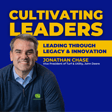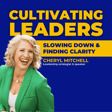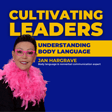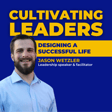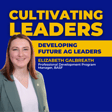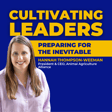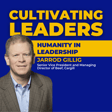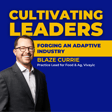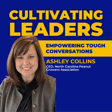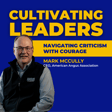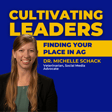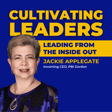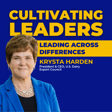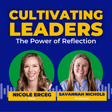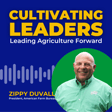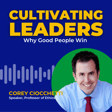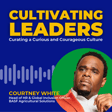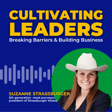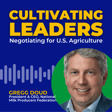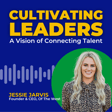Importance of Workplace Support
00:00:02
Speaker
you know i would I would encourage people who are out there you know looking for the next job or evaluating you know what it is they like or don't like about their current job. It's does your job invest in you and and do you feel supported in in your development and in who you are at work? Because it makes a big difference if you come to work every day and know that you're supported.
Introduction to Cultivating Leaders Podcast
00:00:30
Speaker
Welcome to the Cultivating Leaders podcast, where we get inside the minds of leaders to harvest great ideas and lessons that help you grow as a difference maker in food and agriculture. I'm your host and curiosity captain, Nicole Ersig.
00:00:43
Speaker
Today's episode leans into leadership that protects our land, values our people, and makes room for every voice in agriculture.
Kirk Mogg's Background and Inclusive Agriculture
00:00:49
Speaker
Kirk Mogg is a partner at Stoll Reeves, a nationally recognized environmental and natural resources attorney,
00:00:56
Speaker
that is not easy to say, and a bridge builder in every sense of the word. From securing water rights and advising on endangered species issues to guiding producers, co-ops, and agribusiness through permitting, compliance, and sustainability regulations, Kirk has built a career working alongside farmers, ranchers, commodity groups, and rural leaders.
00:01:14
Speaker
As a leader who has had to navigate what it means to belong in agriculture, he is helping create a more inclusive, equitable landscape in an industry that hasn't always known what to do with difference. He stands at an intersection not many talk about publicly, tradition and change, personal identity, and professional purpose.
00:01:29
Speaker
Welcome to the pod, Kirk. i gave kind of a very brief overview of you, but what did I miss from your bio? i Help us get to know you a bit better.
Kirk's Upbringing and Educational Journey
00:01:38
Speaker
Yeah, I think the the big thing, especially as relevant to to this podcast, is I'm a farm kid. um I grew up 15 miles from a town of 1,500 people on a family farm and feedlot.
00:01:51
Speaker
um In my K-8 school where where I started my education, there were fewer than 100 students. There were nine kids in my eighth grade class.
00:02:02
Speaker
um and then went to the the big high school 15 miles away where my graduating class from high school was closer to 70 people. Yep, ah like rural with a capital R, definitely. Yes, absolutely.
00:02:15
Speaker
yeah Eastern Oregon, even in the other time zone, that's that's the trivia fact that most people don't know. ah Far eastern Oregon, Malheur County, part of the county is in the mountain time zone.
00:02:27
Speaker
Yes, it is middle of nowhere, but in a good way. It's beautiful. ah So Kirk, tell me, what did your career path look like? How did you get to become an environmental and natural resources lawyer from starting as a farm kid to where you are today?
00:02:41
Speaker
Yeah, I would say that one of the biggest influences in my life, and and this is, ah I think, something that you and I share, Nicole, um a connection to for h and FFA.
Pivot to Environmental Economics
00:02:52
Speaker
ah got involved in 4-H from a young age, taking steers to the county fair, and then I got involved in in FFA and you know was involved in the livestock aspects, but probably dove deeper into the leadership aspects of that.
00:03:09
Speaker
So competed in public speaking, competed in parliamentary procedure, um the full the full gamut of career development events and leadership development events that FFA has to offer.
00:03:20
Speaker
And that took me my senior year of high school deciding run for ah to deciding to run for a a state office, an Oregon FFA state office, and got elected. And in Oregon, we take a gap year. So the year between high school and college, I traveled around the state and really experienced the true diversity of Oregon agriculture, both in terms of the commodities that are grown, but also the people.
00:03:47
Speaker
um That took me to, well, if we take one step back, when I was a senior in high school getting ready to decide where to go to college, um I was getting the heck out of Oregon.
00:04:00
Speaker
um I was going to go to Colorado State. i was I was going to major in animal science and ag economics, and my path ah was was going to look very different. my During my state officer year, ah my teammates, four of whom were planning to attend Oregon State University, said, gosh, you you got to check out Oregon State. Give it give it another chance.
00:04:23
Speaker
And so I sat in on a class ah taught by Dr. Fred Obermiller. We called him Dr. O. And he taught He was an economist by training, but taught classes focused on kind of the intersection of law and policy or environmental and natural resources law and policy.
00:04:43
Speaker
And I sat in on one of his classes. His students were absolutely hooked on the content and and the students were passionate about ah careers in environmental and natural resources law and policy.
00:04:59
Speaker
And I decided right then and there that I was going to to pivot. um Wasn't going to go to Colorado State, was instead going to ah apply for and enroll at Oregon State and major in environmental economics policy and management.
00:05:14
Speaker
And you know that really set me on the path to going to law school and pursuing a career working with agribusiness ah and other natural resource industries post post law school.
Legal Work in Agribusiness
00:05:32
Speaker
Tell me a little bit about the work that you get to do today. What does it look like to be a farm kid, natural resources, environmental lawyer living in Portland? ah How do you connect the rural background and the urban lifestyle today?
00:05:48
Speaker
Yeah, so I would say my clients are made up primarily of agribusiness, timber companies, water suppliers like irrigation districts, and some some manufacturing clients. But 80 plus percent of my work is working with clients in the natural resource industry.
00:06:10
Speaker
um Again, mainly agribusiness and timber. So I'm working with those clients day in and day out. I would say the clients that I work with, um you know
00:06:24
Speaker
I help them ah accomplish their objectives, but a lot of times folks in the in the in natural resource industries, they don't they don't necessarily ah want to have to work with a lawyer.
00:06:36
Speaker
I don't know that anyone wants to have to work with a lawyer at any time. think Exactly right. um But I think if they're going to work with a lawyer, they want to work with a lawyer who understands the industry.
00:06:50
Speaker
It's one thing to understand the law, but A lot of the challenges that I help my clients face, you can't just divide between what's the legal side of it and what's the practical side of it or how does it impact the business on the ground.
00:07:05
Speaker
And so I think my clients appreciate that I come with a practical perspective. I come with on-the-ground experience, and i I come with an understanding of how these things work in real life so that my client doesn't have to pay me so that I can learn what it is
Rural Influence on Urban Life
00:07:24
Speaker
they're doing. um I know some of that from my background.
00:07:28
Speaker
And it just allows for a more authentic relationship where um I think there's there's an opportunity or there there exists this... um
00:07:39
Speaker
kind of foundation of trust that comes from working with people with some shared experiences, shared backgrounds. And so I think it allows the relationship to kind of deepen um easier and and it sets up um a starting point for a very successful relationship.
00:07:58
Speaker
you know you You referenced um kind of the the connection to you know urban urban living and and you're absolutely right. So I live in live and work in downtown Portland.
00:08:09
Speaker
um For the last 13 years, I've lived um within a 10 minute walk of the office in ah in a downtown condo. So very, very different than than the farm that I grew up on.
00:08:22
Speaker
um i would say one of the things that I love most about it is um not having to deal with traffic or a commute. I have a 10 minute walk to work, maybe 11 minutes if the crosswalk signals aren't timed to just right.
00:08:36
Speaker
That's a pretty nice commute. It is. Awesome.
Career as a Calling for Rural Voices
00:08:40
Speaker
So, Kirk, tell me, when did you really start to feel like, or you can tell me that you don't feel like this, but that environmental law, natural resources law was not just a career, but like a calling, like, hey, I'm meant to do this.
00:08:55
Speaker
Yeah. I think probably speaks to your ability to connect across differences like farm kid to urban and even natural resources and agriculture sometimes can can be seen as adversaries. so Yeah, so I mentioned that and sitting in on a class at Oregon State with Dr. O was what got me to Oregon State and what ultimately got me interested in a career in law and policy.
00:09:23
Speaker
And you know i'll I'll expand a bit bit on that that because i think that is where I kind of understood this to be more than just a career. O... dr o really understood that um natural resource industries need people um working in law and policy who understand the industries.
00:09:50
Speaker
And a lot of times farmers and ranchers aren't like encouraging their kids to go out and be lawyers and lobbyists. Like those are the two dirty L words. Like but that's not what we want our kids to be. We want our kids to be like farmers, ranchers, maybe a doctor, like that'd be nice.
00:10:06
Speaker
um But I would say most um farm families aren't like, gung-ho about, ooh, I'm going to send my kid off to be a lawyer or a lobbyist. But if if kids with rural backgrounds, with roots in natural resource industries and rural communities aren't going into law and policy, who who is going to advocate for those industries? who Who has the passion for those industries, the roots in those industries, um who understand the challenges those industries face? And so...
00:10:38
Speaker
I kind of took it as as kind of a calling to be one of those people that grew up on a farm and feedlot that had generations of family connections to the ag industry to say, i'm going to go um work on behalf of natural resource industries and hopefully um help make things a little bit easier for them.
00:10:59
Speaker
love that. ah So tell me, Kirk, did you always feel like you ah belonged in agriculture?
Identity and Belonging in Agriculture
00:11:06
Speaker
So yes, I think it's a yes, but.
00:11:10
Speaker
Yeah. i I mean, I grew up in in a small town where it's a very, very tight-knit community. And if you're from there, people embrace you. Like, you're you're one of the hometown kids, and people are there supporting you at sporting events, at FFA events, at the county fair.
00:11:28
Speaker
Like, it's ah it's a very tight-knit supporting community. And if you're from there, um you know, the community kind of wraps its arms around you. um you know It was also a community where I had lots of of family, cousins, second cousins.
00:11:47
Speaker
you know I grew up one road away from Mog Road. My cousins lived on Mog Road, but I lived one road road down from that. So like you know when when that when that's the community that you grew up in, There is a feeling of belonging.
00:12:02
Speaker
um I think the but part is i don't know that I, well, I know that I didn't always feel like I would be able to show up bringing all my identities to the table and be able to be fully and authentically me.
00:12:17
Speaker
I mean, I knew that I was supported, um loved in my family and community. But I wasn't sure that extended to every identity that I would bring to the table um and that I could be fully and authentically me. yeah And that, I think, extends beyond just my kind of hometown and home community, I think I can expand that more broadly to the agriculture industry as a whole.
00:12:43
Speaker
I knew that I belonged in and would be welcomed in the ag industry because I always had been. I mean, that's who I am, who I was, um but I wasn't always sure that I would get to bring my full authentic self to the table. And even when I was in in law school in my mid-20s, I kind of thought that I had to choose. I could choose to pursue um a career that I was passionate about and keep some of my identity...
00:13:16
Speaker
private or i could choose some other career path and be fully authentically me and bring all of my identities to the table. And i will say, um when I got out of law school, I had kind of picked the I'm going to pursue my career passion and not in kind of put to the side and keep private um part of of who I am.
00:13:42
Speaker
Fortunately, um I started working and at my current law firm. So I've been at Stoll Reeves for 15 years. i Even before that, I was a summer intern.
00:13:55
Speaker
And a couple of years into working here, um i i kind of took the the leap of faith and decided um i'm going to be able to be better at both my job and in in all of my relationships if I can bring my full authentic self to the table.
00:14:13
Speaker
And it it happened over a little bit of time, but but pretty quickly. And, you know, so happy that I did that because i've I've found that I can absolutely pursue the career that I'm passionate about and bring my full authentic self to the table.
00:14:31
Speaker
So tell me, ah as you went on that journey, I think one of the things you highlighted is like you could be better at your job and have a better life when you like weren't separating the parts of Kirk instead of just being full, your full self.
00:14:46
Speaker
ah Can you talk about a little bit more of what that journey was like and then how it's led to some of the leadership experiences or leadership roles that you have in the industry today and your work with Cultivating Change?
00:15:01
Speaker
Yeah, I think it's easier to build relationships with people when you're able to be authentically you and not kind of be guarded in how you're having conversations with people.
00:15:17
Speaker
And because i think one of the things that... um
00:15:24
Speaker
one of the things that happens, like there are just certain things that come up in casual conversation, like, um Are you married? And, or, you know, I'll use a very specific example.
00:15:39
Speaker
Even within the last year, um i was at a large timber conference having a kind casual conversation with someone that I've interacted with in a professional setting quite a bit.
00:15:51
Speaker
And there was a lull in the conversation and he turns to me and says, so Kirk, what does your wife do? And um I would say probably 10 years ago, um my response would have just been, oh I'm not married.
00:16:08
Speaker
and And that's a fully honest and authentic answer, um but it's kind of not the whole answer. And, you know, and and so today, like, i responded, like, oh, I'm not married.
00:16:22
Speaker
And I'm also not straight. and And just to just be kind of transparent about, like, who I am. And and and I think that actually deepened my connection to this person because, like, we're...
00:16:37
Speaker
we're allowed We're able to be you know fully open and authentically ourselves. And the fact that I was willing to be transparent with him, um i think, was helpful. But I think early on when when I was kind of navigating this journey between how how how transparent to be, how open and authentic to be.
00:17:01
Speaker
um i think there were times that um conversations and relationship building was inhibited because I was careful when people would ask like, oh, what did you do last weekend? It was like, oh how do i how do i frame what I did this past weekend in a way that doesn't give away like some something that I don't want to share with other people. And so I feel like just being less guarded,
00:17:26
Speaker
um leads to deeper, more authentic relationships. Oh, 100% agree. I think across anything, right? of I read something recently, even that ah when we're doing you're doing zoom or Zoom conversations like this, people who have a fake background versus like even just showing where you're at. like Simple things of just being able to be like, yep, I have a duck decoy in my background and you know or hot pink curtains. like It shows who you are and it creates opportunities to build connection.
00:17:57
Speaker
um And yeah, so I think so many people can relate to this, Kirk, of whether you're trying to navigate just even how to be professional or how to show up authentically, anytime you are trying to be so guarded, it it's harder to even communicate and it's harder to build relationships and connections and even work with people sometimes, right?
Cultivating Change Foundation Overview
00:18:20
Speaker
So tell me about ah Cultivating Change and how you got involved with the organization and and for even those listeners, what it is.
00:18:30
Speaker
Yeah. so the Cultivating Change Foundation is a national nonprofit that focuses on valuing and elevating lgbt q plus individuals in food and agriculture industries.
00:18:44
Speaker
The organization started back in 2015,
00:18:49
Speaker
And it was it was an event before it was an organization. So the first event was the Cultivating Change Summit. It was a gathering of um gay men with connections to the ag industry in Atlanta, Georgia um in August of 2015.
00:19:08
Speaker
and It was probably a three-day event. And at the end of it, there was kind of this question of, is this worth doing again? And the answer was a resounding yes, this needs to continue.
00:19:22
Speaker
And so some planning went into, well, what happens next? um the the The first part of the what happens next was... um hearing the feedback ah from other components of the LGBTQ community that was like, hey, ah you had a conference for um gay men involved in agriculture.
00:19:44
Speaker
How about you include the rest of us at the table next time? um Maybe you could be a bit more inclusive. And so while the first Cultivating Change Summit was primarily if not exclusively for gay men.
00:19:57
Speaker
The second Cultivating Change Summit that happened in Sacramento in 2016 and 17, the invitation was open to kind of anyone in in the LGBTQ plus community plus allies um to come together and really focus on that mission to value and elevate LGBTQ plus folks in in food and agriculture.
00:20:21
Speaker
And as part of this, okay, we're going to make this an annual event and, you know, create more programming around it. There was a recognition that there needed to be um some, a formal organization or entity around that. And, and that, and That's what led to the creation of the Cultivating Change Foundation, which is the you know nonprofit entity that now puts on the Cultivating Change Summit.
Inclusion at Stoll Reeves
00:20:51
Speaker
So I was on the board of the Cultivating Change Foundation from kind of its inception through the end of December December. twenty twenty four this this past december so spent nearly years on the board,
00:21:05
Speaker
and you know i'm really proud of of the growth of the organization and the work that was done to to fulfill that mission. Just three weeks ago, we hosted the most recent Cultivating Change Summit here in Portland. 120 plus individuals came together to support the mission of the organization and um was fortunate.
00:21:28
Speaker
and And again, this goes to the support that I've felt from the place that I work. um We hosted ah the opening reception for the summit here at at the law firm where I work. And we've got 30th floor views of all of downtown Portland and and the mountains around it.
00:21:46
Speaker
And it was great to be able to kind of bring people to my home city and and introduce them to it. And at the same time, um focus on the really important work of the Cultivating Change Foundation.
00:22:00
Speaker
Yeah, you said something there, Kirk, that really struck with me of the feeling of support that you have from the place that you work. ah Talk to me about how important that is. And as we think about emerging leaders and finding the right environment for for themselves in their career, like how how maybe it sounds like you've been with Stull Reeves pretty much your entire career. Right. Like ah but if you think about that feeling of support and belonging, how critical that is to the work that you do in natural resources and agriculture.
00:22:34
Speaker
So Stoll Reeves has been an an incredibly supportive place to work. um you know I was not out when I was a summer intern at Stoll Reeves. I was not out when the first year or two that I was at the firm.
00:22:48
Speaker
um But the firm is engaged in a lot of different community events. And I remember getting an internal email about this annual gala for Basic Rights Oregon. And Basic Rights Oregon um is an organization that ah focuses on kind of advocating on behalf of the LGBTQ plus community here in Oregon.
00:23:14
Speaker
So there was this annual fundraiser gala. And at the firm, we have... We sponsor lots of different nonprofits um that are that my colleagues are on the boards of, but emails will go out and say, hey, we've got 10 tickets for this event. Who wants to go?
00:23:30
Speaker
And again, i was not I was not out at the firm at the time, but um kind of took this leap and requested two tickets to the Basic Rights Oregon Ignite Gala and took a date to to that event.
00:23:43
Speaker
And i remember kind of... I mean, that that was really my kind of coming out at work, um or at least ah the this the soft launch. And um i remember distinctly my date got up to to go to the bathroom about halfway through dinner, and the co-worker sitting next to me turns and she's like,
00:24:03
Speaker
okay, we're dying to know, are you just here as an ally or is that your date? um And and that was it was so um welcoming and um it it really kind of paved the way um for for kind of coming out to others at work and recognizing that but I had chosen a firm that was very, very open and accepting.
00:24:28
Speaker
And I guess even even taking one step one step further back, I remember when I was kind of deciding what firm to to work for, I remember Googling ah the different attorneys in the environmental and natural resources group and ah found the bio of one of the attorneys in the group.
00:24:49
Speaker
um and And the bio indicated that she had been involved with LGBTQ plus organizations. And At that time, I still didn't know whether I would be someone who would be out at work um or or out at all. I mean, I wasn't out to anyone at the time.
00:25:08
Speaker
But knowing that there was someone who worked at Stoll in the group that I wanted to work in, the Environmental and Natural Resources Group, who was involved in the LGBTQ plus community and related organizations...
00:25:28
Speaker
that signaled to me that it was a place that was welcoming and belonging. So, you know, I don't know that I thought that much about it at the time, but it was just one of those factors that weighed into, oh this is a place where i could be out if I wanted to be.
00:25:48
Speaker
And so my my experience just has continued to be one where all of these early signals that I had that that Stoll Reeves was, was a ah very welcoming and inclusive place has, has proven to be true um time and time again. and And that included the first cultivating change summit before it was even, you know, when it was in its infancy, it was just a, let's try this thing. One time i emailed the person who was the head of ah the environmental and natural resources group at the firm and said, Hey,
00:26:23
Speaker
um this event's happening. um They're looking for sponsors. I think it'd be great if Stoll helped support. And Stoll was probably within the first three to five sponsors of the first Cultivating Change Summit um because the firm values inclusion and belonging and wants to support people at the firm. And I was probably a... Oh, I guess I... i
00:26:55
Speaker
No, i was I was still an associate. I wasn't a partner yet at the firm. So the the practice group leader was investing in kind of a mid-level associate at the firm. And um there there have just been so many examples like that where the firm has made investments in me.
00:27:12
Speaker
And... know Some of that's on the kind of inclusion and belonging side of things, but that's not the only place that the firm invests in me. i mean, the firm has sent me to trade association events from the time I was... like i had been at the firm for three months and I went to...
00:27:30
Speaker
um a water resources trade association event. And lots of times, first-year attorneys, you know, they stick you in an office and say, you know, bill hours do work.
00:27:42
Speaker
But Stoll really supported me in my um professional development as well. And so I... would be remiss if I didn't say, know, the investments in me are not just in an inclusion and inclusion and belonging space, but in kind of every professional development space. And, you know, I would encourage people who are out there, know, looking for the next job or evaluating, you know,
00:28:14
Speaker
what it is they like or don't like about their current job. It's does your job invest in you and and do you feel um supported in in your development and in who you are at work? Because it makes a big difference if you come to work every day and know that you're supported.
00:28:31
Speaker
Oh, absolutely. Absolutely.
Attracting Youth to Agriculture Careers
00:28:34
Speaker
So Kirk, I'm curious, ah in the work that your personal journey, but in the work that you've done with cultivating change, what would your message be to the next generation of agricultural leaders, the people who will be making these decisions or who are leading teams about how we can make agriculture better? And I'm just going to say better.
00:28:58
Speaker
yeah So I'm going to start with, ah we hear over and over again that we need more people coming back to careers in agriculture, particularly young people. I mean, we've we've all seen the statistics about, especially on the production ag side, that the average age of the American farmer keeps going up, up, up, and and that's not sustainable.
00:29:21
Speaker
um If we want ag to thrive into the future, we have to change that trajectory. um We have to get people returning to the industry and and that production agriculture um into every other facet of of agribusiness.
00:29:39
Speaker
the way we bring more people to the ag industry is we change the perception. And sometimes it's perception, and I think sometimes it's reality. But there is absolutely, at a minimum, a perception that that the ag industry isn't always open to everyone.
00:29:58
Speaker
And I think that we will have more people opt in to the ag industry. kids that grew up in ag or through some experience in 4-H or FFA found this passion for ag, that they want to do it, but might have this perception in their mind that agriculture is not for them or a career in agriculture is not for them.
00:30:23
Speaker
And so whether whether this idea that The ag industry doesn't embrace difference is perception or reality.
00:30:34
Speaker
um People are choosing careers other than ag because of the perception that the industry isn't for them. And so we need to double down on our commitment to changing that perception because if we have people who are passionate, young people in particular, who are passionate about ag, we do not want them opting out because of a perception that they aren't welcome in the industry. Yeah, absolutely.
00:31:02
Speaker
How do you think ah we can change that perception? You know, if you think about the people who are listening, there's leaders across food and agriculture that I think can do this in the environments that they are in on an individual basis, or even if you have ideas on more of a macro level.
00:31:18
Speaker
Yeah, um you know, i I certainly don't have any silver bullets, but I think that
Language and Inclusivity in Agriculture
00:31:24
Speaker
it's... um I think one way is engaging with organizations.
00:31:29
Speaker
um It could be MANRS. It could be the Cultivating Change Foundation. um Engaging with organizations where um young people, people earlier on in their careers, um but who bring different identities to the table than than are kind of the majority in the ag industry.
00:31:51
Speaker
if if companies, leaders engage with those organizations, I think they will find um tips, tick, tricks, strategies that will help them build more inclusive organizations.
00:32:05
Speaker
um I also think just building those relationships can be helpful. um
00:32:14
Speaker
I think it's also, whether through those organizations or others, um just being cognizant of how um kind of the language that's used can signal um ah an openness and welcoming to to people who are different. And and this isn't to to to be like the word police at all, but the the idea that um if your first question to you know, let's say you're
00:32:45
Speaker
you know, ah a leader at an ag company and you're at a job fair or you're at at a dinner talking to, you know, college students that are considering what their next career is.
00:32:56
Speaker
If, if the question is, oh do you have a girlfriend? um you know, that, that isn't, that might send some signal about, you know, what the culture is like where you work.
00:33:11
Speaker
um And, and, I don't want people to think that, oh, if you say one wrong thing like that, that's the the the death knell to to building a relationship with someone who is is part of who brings a different identity to the table than you.
00:33:25
Speaker
But I think just being aware of how um how you approach people in conversation can signal um an openness or willingness to...
00:33:36
Speaker
um to include and bring in others who might bring different identities to the table. Yeah. it just how are you signaling more like warmth and openness and that, Hey, I'm curious about who you are as a person. Yeah.
Focusing on Positive Experiences
00:33:55
Speaker
I'm curious, Kirk, what would you say to someone who is working in ag right now, who's questioning if they belong? I guess my experience continues to be a very positive one. um You know, when i first started coming out in the ag industry, I i expected... and i think i was i was optimis i was still optimistic, but I expected there to be more uncomfortable conversations than there have been. I expected there to be more people who...
00:34:30
Speaker
um We're not open to you know embracing, accepting me for who I am. But I have been continually surprised and heartened by the fact that I have been able to bring my...
00:34:49
Speaker
full authentic self to the table over and over again and be absolutely accepted. So, I mean, that includes bringing ah date to a sponsor's dinner at the Oregon FFA convention. I mean, that includes to being very out and open about who I am in every leadership position that I've ever held, regardless of whether that's you know, that organization is affiliated with or connected to LGBTQ plus issues. So I guess I would say the future is bright and we're moving generally in a positive direction. That's not always the case.
00:35:31
Speaker
um I also appreciate that I am... um that my experience in Oregon is probably different than people's experiences elsewhere.
00:35:43
Speaker
um So, you know, I can't say that every interaction that everyone has is going to be as positive as as the one I have had um But I do think that there are organizations out there like called the Cultivating Change Foundation, like MANRS,
00:36:03
Speaker
um other organizations out there where people can find community that both embraces and celebrates their differences, but also brings an ag connection. So maybe in maybe in your hometown, there isn't that community of folks that share similar identities, but I think there are opportunities to find those communities and connections in a way that I think um well will help people feel more optimistic about the future. What i love hearing you tell your story, Kirk, and this is an observation, so you can correct me if I'm wrong.
00:36:46
Speaker
It sounds like part of your positive experience has been because you were looking for the positive pieces and the opportunities and the, like, here is where i I do belong, you know, looking for things that, that allowed you to live into your full self.
00:37:04
Speaker
And as someone who, for, you know, a variety of reasons, ah like I've had experiences where I've sat at tables in agriculture that I felt like I did not belong. And people who have made me feel that way.
00:37:18
Speaker
But when you, when I hear it from your story, thinking about looking at it with a positive lens versus what the potential downside could be, i think that puts the power in the control of the person who is maybe feeling that way to how you can shift and change and find where you do belong in ag.
00:37:37
Speaker
Yeah. And I think the other thing for me don't, um i don't think that every, um and you know I'm going to use LGBTQ+, because that's the perspective that I bring, but it whether you're a person of color or a woman um coming to the table in Or a young person in a group of, yeah, so senior people. Yeah. yeah I don't think that every person who who brings a kind of minority perspective to the table needs to make it their mission to like be the advocate for that.
00:38:18
Speaker
group. um But I've decided that for me, that's a place that I can make a difference. And i appreciate that I come from, you know, whether you call it privilege or opportunity, whatever word you use, I grew up in ag.
00:38:33
Speaker
I grew up on a family farm. I grew up in a community where, like I mentioned earlier, like my, the road down the street was named after my family, like deep connections in ag. Um,
00:38:48
Speaker
formed really, really tight connections through my experiences with FFA and at Oregon State, and then started a career at Oregon's largest law firm doing work in the ag and timber space.
00:39:02
Speaker
um I have the opportunity to share my voice and share my experience, and I'm going to do it in in a transparent way, in a way that um I bring all of myself to the table because i think that for me,
00:39:20
Speaker
one way that I can make a difference is hopefully to show some other young person out there that a career in agriculture is absolutely and opportunity and an opportunity that's available um for for someone who is LGBTQ plus person.
00:39:39
Speaker
Because, you know, I think whether it's in a career or just some sort of organization, seeing someone like you succeed um is really important for a young person who is asking themselves the question, can I succeed here?
00:39:59
Speaker
And if there is someone like you who has made it, it's just one more um data point that suggests that, yes, I could make it too. Yeah, absolutely. i think I think that's so important.
Bridging Urban and Rural Communities
00:40:14
Speaker
Kirk, if you are ready, we, I think, are going to move into a section we call rapid fire, ah which I am terrible at because I tend to ask follow-up questions, but we will try to get through this with short answers answers only Okay, what gives you hope for the future of agriculture? Young people. um That's what gives me hope for the future of agriculture.
00:40:35
Speaker
I spend a lot of time working with um nonprofit organizations that that primarily focus on young people. And the reason that I do that is because every time I'm around young people with a passion for agriculture, I leave feeling more excited and optimistic about the future.
00:40:53
Speaker
Whether that's FFA or the Cultivating Change Foundation, um young people have new ideas. um They are excited about the future.
00:41:07
Speaker
And i know that if we continue to support the development of those young people and show them that ag is a place where they can absolutely have a fulfilling career, that our industry will be in great hands going forward.
00:41:22
Speaker
What is one thing about being a lawyer that you did not expect? how much time I spend in front of my computer um responding to emails, like hundreds of emails a day. um it Yeah, you know people ask me like, oh, do you travel a lot for your job? um I do go to conferences.
00:41:43
Speaker
um because I love spending time with my clients and learning about things that are affecting the ag and timber industries. But 99.5% of the work, the real work that I do, um can be done sitting at my desk from my computer.
00:42:00
Speaker
ah What's yeah a hill you'll die on about leadership or agriculture? You know, i've I've kind of touched on this already, but I think the hill that I will die on is If we want more young people to be involved in the agriculture industry for their career, we have to make sure that every person who is passionate about agriculture feels welcome in the industry, regardless of their sexual orientation or gender identity or any other kind of minority status that they bring to the table.
00:42:32
Speaker
Let's make this a big tent where everyone feels welcome. Okay. So the next thing we always ask our guests, Kirk, AFA loves hot takes. So unconventional, bold opinions, either about agriculture or leadership.
00:42:49
Speaker
And I am curious, what is an unconventional or bold opinion, a hot take that Kirk has about leadership or ag? Yeah. So I don't know how much of a ah hot take this is, but I think our conversations on a national level or even even a narrower level than that,
00:43:11
Speaker
we things continue to get more tribal. It's one side versus the other. And I see that manifest itself a lot in urban versus rural. and I think that in the ag industry, we need to spend less time painting our kind of urban neighbors as the enemy and taking more time to invest in building bridges and building relationships.
00:43:39
Speaker
um Most ag products, or at least food crops, end up getting consumed in urban areas. That's where the majority of the population is.
00:43:50
Speaker
and And instead of um kind of retreating to my side versus the other side, or, you know, I just don't like going to the city, um we need to be building more of those bridges and developing those relationships because I think...
00:44:08
Speaker
our urban neighbors will support ag more um when they understand ag and particularly the people in ag more. I mean, we've seen a lot in terms of the kind of local food movement, which I think is very good in certain respects for for American agriculture.
00:44:28
Speaker
That isn't to say... and And maybe and another kind of component of this this hot take is I hate it when um one segment of the ag industry goes after another segment of the ag industry, that it has to be, you know...
00:44:45
Speaker
local versus mass produced or conventional versus organic. Like let's, ag has enough challenges without infighting within the ag community.
00:44:56
Speaker
Amen. Preach. but But back to this kind of urban rural um building relationships piece. As people better understand where their food comes from, i think they will be more supportive of policies that benefit the ag industry because there are a lot of misperceptions out there.
00:45:15
Speaker
And if we keep the walls up, if we keep this this trench between urban and rural growing, we aren't going to have the support we need from the population centers when it comes to voting, electing people, um developing policy.
00:45:34
Speaker
that that we need to support a thriving ag industry now and into the future.
Connecting with Kirk
00:45:41
Speaker
Great hot take. ah If I had to sum it up, it's that we we need urban America as much as they need us.
00:45:49
Speaker
Absolutely. And remembering that... um ah Yeah, so important. And I love the, gosh, we have enough problems to deal with without fighting each other. Yes. sure. Well, Kirk, thank you so much for your time today. It's been wonderful to chat with you. ah AFA is all about building relationships, building connections, building bridges.
00:46:09
Speaker
Where can people connect with you? um People can find me on LinkedIn. Yeah. Fortunately, my name is fairly unique. So if you Google me you can find me.
00:46:23
Speaker
um And people can can always reach out via email. Kirk, K-I-R-K dot mog, M-A-A-G at stole, S-T-O-E-L dot com.
00:46:38
Speaker
Thank you so much, Kirk. Well, thank you for the time today and for sharing your story. It's been an enjoyable conversation for me and fun to catch up with you. ah And I appreciate, um I know that but I got something out of this and I'm sure our listeners have as well.
00:46:52
Speaker
Thanks for listening to the Cultivating Leaders podcast brought to you by Agriculture Future of America. you've been here before, you know we value feedback as a gift. Please leave us a review and let us know how we're doing.

